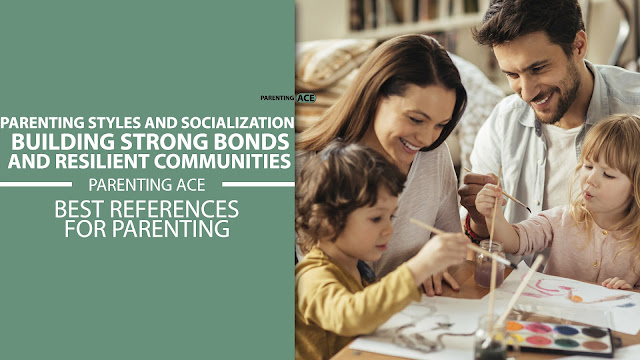Exploring Parenting Styles and Socialization: Fostering Strong Bonds and Resilient Communities
In the intricate tapestry of society, parenting serves as the loom weaving the threads of individual development and communal resilience. At the nexus of parenting styles and socialization lies a profound interplay, influencing not only the trajectories of children's lives but also the fabric of our communities. In this blog post, we embark on a journey through the complexities of parenting styles and social dynamics, exploring how nurturing strong bonds between parents and children lays the groundwork for resilient communities. Join us as we unravel the intricate connections between parenting practices and societal cohesion, illuminating pathways to foster empathy, resilience, and interconnectedness in the world around us.
 |
| Parenting Styles and Socialization: Building Strong Bonds and Resilient Communities |
Parenting stands at the heart of societal dynamics, shaping not only the development of individual children but also influencing the fabric of communities. The intricate interplay between parenting styles and socialization processes underscores the importance of understanding how parental practices impact the broader social landscape. This article delves into the various parenting styles, their implications on socialization, and how nurturing strong parent-child bonds can contribute to building resilient communities.
Understanding Parenting Styles
Psychologists have identified four main parenting styles: authoritative, authoritarian, permissive, and uninvolved. Each style differs in the balance of warmth, control, and responsiveness it offers. Authoritative parenting, characterized by high levels of warmth and responsiveness coupled with reasonable levels of control, is often associated with positive outcomes for children, fostering autonomy, self-regulation, and social competence. On the other hand, authoritarian parenting, marked by high control and low warmth, may lead to obedience but can hinder the development of critical thinking and autonomy. Permissive parenting, characterized by high warmth but low control, may result in children lacking discipline and struggling with boundaries. Uninvolved parenting, with low levels of both warmth and control, can have detrimental effects on children's emotional and social development, leading to feelings of neglect and insecurity.
The Role of Parenting Styles in Socialization
Parenting styles play a crucial role in the socialization process, influencing how children internalize societal norms, values, and behavioral patterns. Authoritative parents, through their balanced approach, provide a supportive environment where children learn to navigate social interactions, develop empathy, and cultivate a sense of responsibility. In contrast, authoritarian parenting may instill compliance with rules but can also foster fear and resentment, hindering children's ability to engage constructively with others. Permissive parenting may result in children lacking the necessary skills to cope with authority or social expectations, while uninvolved parenting may leave children feeling disconnected from societal norms altogether.
Nurturing Strong Bonds and Resilient Communities
At the heart of effective parenting lies the cultivation of strong parent-child bonds. These bonds serve as the foundation for healthy socialization, fostering trust, open communication, and emotional support within families. When parents prioritize nurturing these bonds through positive interactions, active listening, and mutual respect, they create environments where children feel valued and empowered to explore their identities and engage meaningfully with their communities. Furthermore, resilient communities are built upon the collective strength of families who prioritize empathy, cooperation, and inclusivity. By embracing diverse parenting styles that prioritize the well-being and development of children, communities can foster resilience, adaptability, and social cohesion in the face of challenges.
Parenting styles and socialization processes are integral components of the social dynamics that shape individuals and communities. By understanding the implications of different parenting styles on socialization outcomes, parents can make informed choices that promote positive development in their children and contribute to the building of resilient communities. By nurturing strong parent-child bonds based on trust, respect, and empathy, families lay the groundwork for fostering social competence, resilience, and interconnectedness within society at large.



Comments
Post a Comment